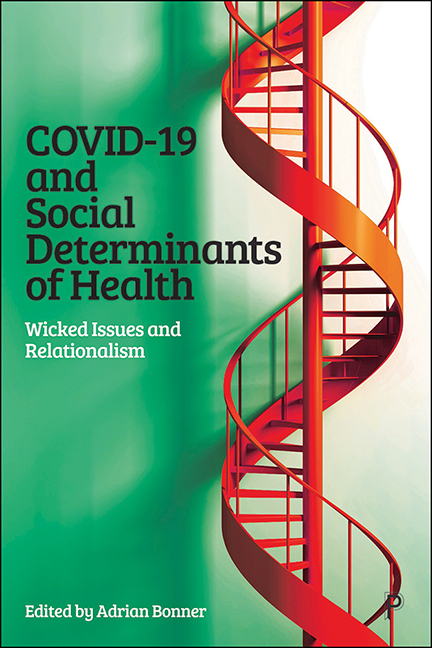Book contents
- Frontmatter
- Miscellaneous Frontmatter
- Contents
- List of figures and tables
- Notes on contributors
- Foreword
- Introduction
- Part I Wicked issues and relationalism
- Part II Regionalism and geopolitical environments
- Part III Public sector, COVID-19 and culture change
- Part IV The third sector
- Part V The case for relationalism
- Part VI Engagement and proposed changes
- Conclusion
- Appendix The Centre for Partnering
- Index
17.3 - Case study: Environmental planning in a post-COVID-19 world
Published online by Cambridge University Press: 18 January 2024
- Frontmatter
- Miscellaneous Frontmatter
- Contents
- List of figures and tables
- Notes on contributors
- Foreword
- Introduction
- Part I Wicked issues and relationalism
- Part II Regionalism and geopolitical environments
- Part III Public sector, COVID-19 and culture change
- Part IV The third sector
- Part V The case for relationalism
- Part VI Engagement and proposed changes
- Conclusion
- Appendix The Centre for Partnering
- Index
Summary
Introduction
The current period of global economic recovery from the COVID-19 pandemic, alongside bolstered international efforts to reach net-zero carbon emissions by 2050, presents a hugely relevant opportunity to reconsider the shape and format of relationships between the private, public and third sectors. In the UK meanwhile, a post-Brexit landscape means that the value of partnering must also be considered in the wake of our shifting relationships with Europe.
Perhaps the biggest example of inter-sector success in these times is the development of, and successful procurement of, a COVID-19 vaccine here in the UK.
It has been suggested in some circles that by resisting the pressures to join a complex EU procurement plan for vaccines, Britain – with its exceptional strengths in scientific research and public–private–academic partnerships – progressed much better through the early stages of the COVID-19 vaccination programme. The UK government understood its role in sharing risk with AstraZeneca and other pharmaceutical research companies; accepting that it should carry some of the burden. Whereas the EU took a much more cautious approach to sharing risk and as a consequence has had less favourable terms of access to vaccines. Equally, it may well be shown with the passage of time that earlier on in the pandemic, the UK’s government acted too hastily in its procurement of personal protective equipment, at times seemingly not following established competitive processes, or thorough due diligence, in favour of speed in the face of adversity (Anon, 2021; see also Chapter 3).
Arguably, a reason to believe that procurement can change for the better was demonstrated in the 2020 delivery of several temporary Nightingale Hospitals across the UK for the National Health Service (NHS). Here, against the backdrop of cost/quality/time criteria that make up every construction contract, the decision was taken to use a framework-based procurement route named Procure22 in response to the urgent need (for rapid delivery of COVID-19 treatment centres). This form of procurement is based fundamentally upon a partnering ethos centred around mutual trust, understanding and collaboration, to agreed commercial rates.
- Type
- Chapter
- Information
- COVID-19 and Social Determinants of HealthWicked Issues and Relationalism, pp. 319 - 325Publisher: Bristol University PressPrint publication year: 2023

